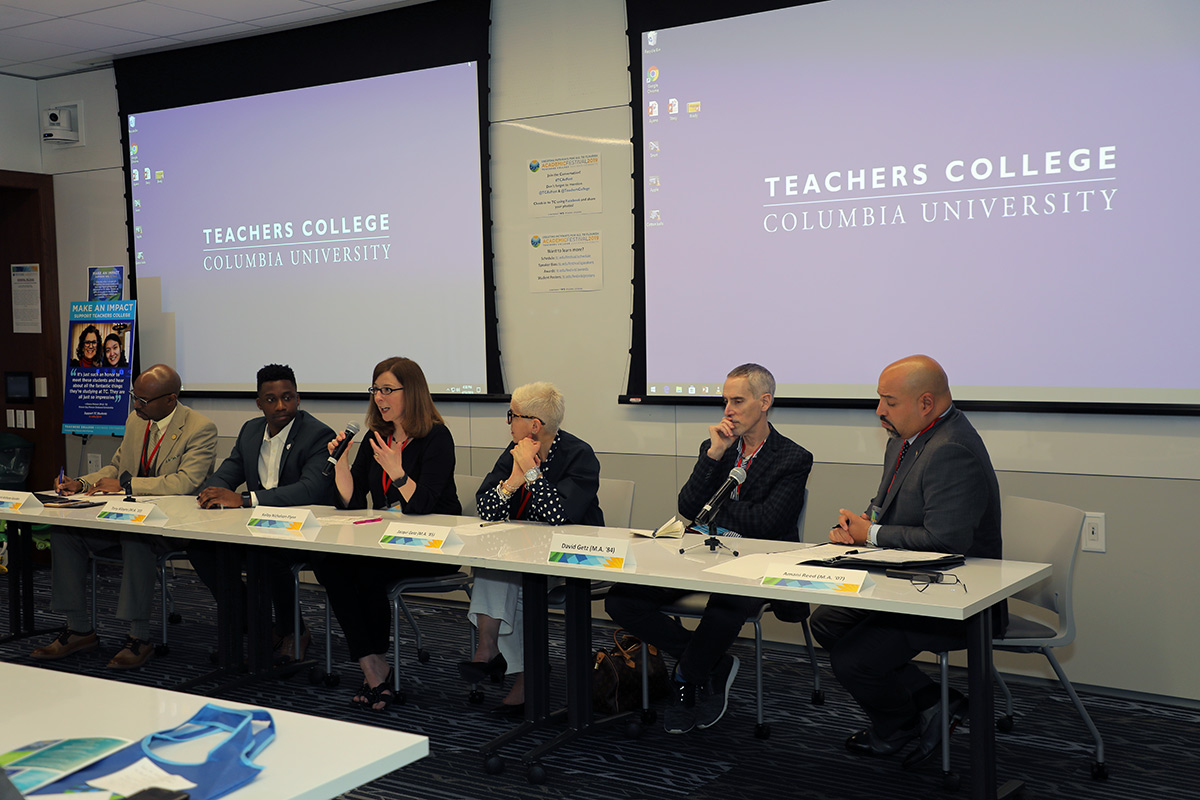Using tax dollars to fund private school tuition has been the subject of some controversy lately. Some say the practice allows parents the freedom to choose a school that they could not otherwise afford, while opponents question whether it erodes financial and community support for public education.
But what would it look like if public and private schools forged alliances to leverage resources, expertise and experience? One breakout session at Academic Festival examined areas in which the two sectors could collaborate to help the nation’s most vulnerable children.
Chaired by Mark Anthony Gooden, Christian A. Johnson Endeavor Professor in Education Leadership, the panel amply represented educators from both sides of the public-private aisle, including Tony Alleyne (M.A. ’10), a 2019 Early Career Award Recipient and Founder of the Delaware College Scholars Program; David Getz, (M.A. ’85), Principal, East Side Middle School; Jacqui Getz (M.A. ’85), Principal, 75 Morton/ M.S. 297; Kelley Nicholson-Flynn, Head of Upper School, Riverdale Country School; and Amani Reed (M.A. ’07), Head of the School at Columbia.
Panelists from both public and private schools said they are focused on instruction in the basics of reading and math, but increasingly immersed in STEM instruction as well. Their schools also are encouraging students, through academics or extracurricular activities, to explore the arts, sports and politics.
Social-emotional learning is a major shared concern, with public and private schools alike developing ways for students to collaborate on solving interpersonal and global social problems. Jacqui Getz described the social-emotional lives of students at her public middle school as “insane” and said that a group of Norwegian principals who recently visited reported the same.
Nicholson-Flynn said social-emotional challenges are mounting at her private schools, as well, reflecting a combination of factors that includes changes in technology, wealth and income disparity in the country at large, and academic pressure.
Reed, of The School at Columbia, spoke of the “risk of being a young person today, not just around race and class and social media. It doesn’t take too long to look at any major newspaper and see what happened to a 12-year old yesterday or the day before in terms of ways they were marginalized or threatened in their school environment, or, to say it more broadly, places that should have been safe.”
Helping students with significant mental health challenges is “the number one problem” at public East Side Middle School, said David Getz, the principal. The school has students with “chronic or acute mental illness, and we simply don‘t have the resources to meet their needs, to help adapt to the demands of the school system, to keep them from getting in trouble. I think that, more often than not, the discipline system is the response to their mental health needs, and I think that‘s wholly inadequate and something we need to address.”
Academic Festival 2019
The day included an extensive lineup of presentations, panels and other events featuring TC faculty, students, alumni and staff.
While private schools tend to be much better financed, most panelists said fundraising is a constant focus for both public and private schools – partly because schools serve not just students but their parents, families and communities.
Schools also are educating children in a world that is changing with ever-increasing speed, and that adults often struggle to understand. “The world that kindergartners in my school will encounter as professionals just doesn’t exist yet,” Reed said.
Funding is a big issue for Alleyne, who heads a highly successful statewide college access program in Delaware for first-generation and marginalized students. It’s challenging, he said, to appeal to funding organizations that range from those in urbanized districts in northern Delaware to those in rural southern areas of the state, which are home to more poor, migrant and undocumented families.
Public schools may have “fewer resources and some kids who are challenging,” said Jacqui Getz, but education “is so joyful and wonderful and energetic, and I think if teachers could share ideas and talk about the minds in front of them, I think we’d all have teachers who just want to get together and do it.”
